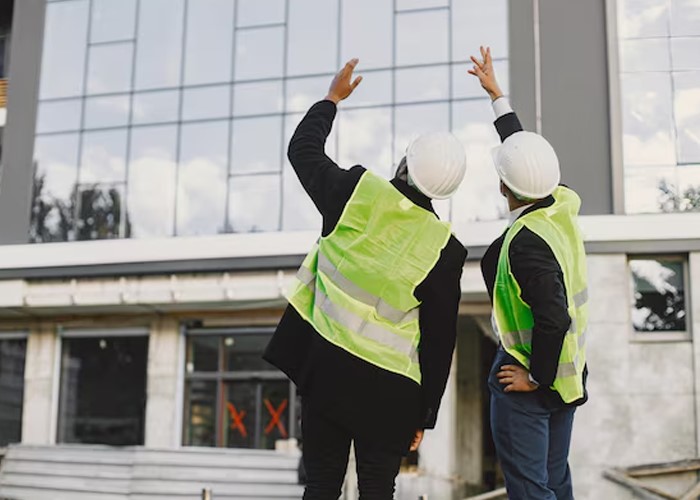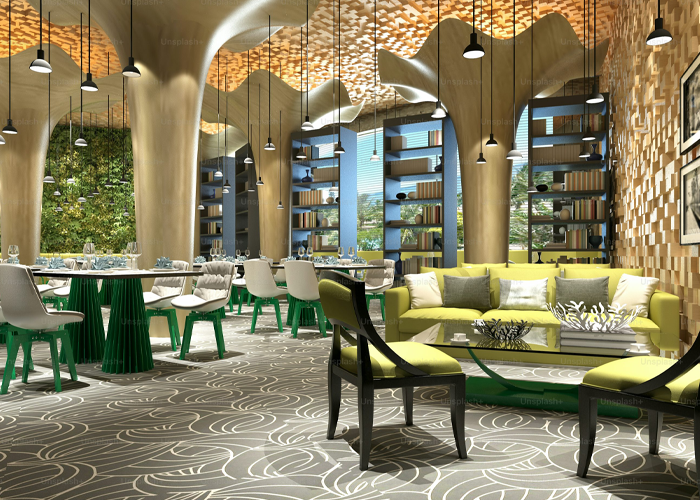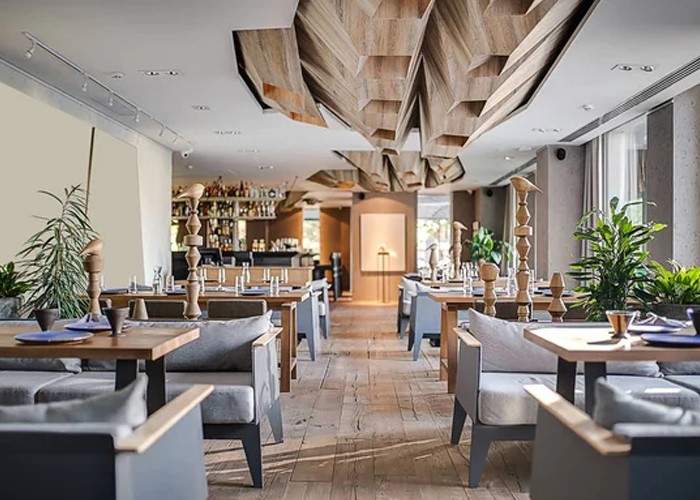Learn how to navigate the restaurant construction process from start to finish. Our comprehensive guide covers key considerations and expert tips.
Are you considering opening a new restaurant? The construction process can be complex and overwhelming, but with the right knowledge, planning, and professionals by your side, it can also be an exciting journey. In this guide, we’ll walk you through the restaurant construction process from start to finish. We’ll cover key considerations, hiring professionals for the job, and provide tips for ensuring a successful project. Whether you’re building from scratch or renovating an existing space, this comprehensive guide will help you navigate the world of restaurant construction with confidence.
Understanding the Restaurant Construction Process
During the restaurant construction process, several key steps must be followed to ensure a successful project. In the design and planning phase, careful attention is given to creating an efficient layout that maximizes space utilization. Additionally, obtaining permits and approvals from local authorities is crucial before construction can begin. Throughout the construction phase, skilled professionals work diligently to bring the design to life, delivering a high-quality restaurant build that meets all safety standards.
1. Pre-construction Phase
During the pre-construction phase of a restaurant construction project, careful planning and preparation are essential. This includes conducting site surveys, obtaining necessary permits, and creating a detailed timeline for the project.
A well-planned and designed pre-construction phase ensures that your restaurant project is executed smoothly, meeting your vision while complying with safety regulations.
Design plays a crucial role in the pre-construction phase as well. Working closely with architects and designers ensures that the restaurant’s layout and aesthetics meet your vision while adhering to safety codes and regulations.
2. Design and Planning
During the design and planning phase of a restaurant construction project, careful consideration must be given to every aspect of the space. This includes developing an efficient layout that maximizes flow and functionality, selecting materials and finishes that align with the desired aesthetic, and coordinating with architects and engineers to ensure compliance with building codes. The goal is to create a well-designed space that not only meets the needs of the restaurant but also provides an inviting atmosphere for guests.
In addition to aesthetics, designing a restaurant also involves practical considerations such as kitchen layout, seating capacity, and accessibility requirements. Collaborating closely with designers and architects helps in creating an optimal floor plan that takes into account these factors while maintaining a cohesive design vision. Thorough planning ensures smooth execution during the construction phase while minimizing delays or expensive revisions down the line.
3. Obtaining Permits and Approvals
To ensure a smooth restaurant construction project, it is crucial to obtain the necessary permits and approvals. This involves submitting detailed plans and designs for review, as well as complying with local building codes and regulations. Be prepared for potential delays or modifications that may be required during this process.
4. Construction Phase
During the construction phase of a restaurant project, it is essential to adhere to the design plans and specifications. This includes hiring skilled contractors and obtaining necessary permits. Construction work will involve building foundations, walls, and installing utilities such as plumbing and electrical systems. The goal is to ensure that all aspects of the build are carried out efficiently and in accordance with safety regulations.
Once construction begins on a restaurant project, it is crucial to closely monitor progress and address any issues promptly. Regular site visits should be conducted to assess quality control measures and ensure adherence to timelines. This phase requires effective coordination among various teams involved in different aspects of construction – from carpenters for interior finishes, electricians for wiring installations, plumbers for piping systems – all working together towards completing the project successfully within budget constraints.
5. Equipment and Furnishings
In the final stage of the restaurant construction process, attention turns to equipping and furnishing the space. The right equipment and furnishings are essential for creating a functional and inviting atmosphere for customers. Here is a list of key considerations:
- Choose durable and high-quality commercial-grade kitchen equipment.
- Select furniture that aligns with your restaurant’s design aesthetic.
- Install proper lighting fixtures to create ambiance.
- Consider acoustic treatments to minimize noise levels.
- Invest in efficient HVAC systems for optimal comfort.
Remember, thoughtful selection of equipment and furnishings can greatly contribute to the success of your restaurant project.
6. Final Inspections and Certifications
Final Inspections and Certifications:
- Building code inspections to ensure compliance with safety standards.
- Plumbing, electrical, and HVAC system inspections.
- Fire safety inspections for the installation of fire suppression systems and emergency exits.
- Health department inspections to verify compliance with food handling regulations.
- Obtaining occupancy permits from local authorities.
As the restaurant construction project nears completion, it is crucial to undergo final inspections and obtain necessary certifications. These comprehensive assessments will guarantee that all aspects of the build meet regulatory requirements in terms of safety, health, and functionality. The following bullet points highlight key inspection areas: building codes, plumbing/electrical/HVAC systems, fire safety measures, food handling regulations under scrutiny by health departments. Additionally obtaining occupancy permits is a must-do before opening your doors to customers ensuring legal operation.
Key Considerations for Restaurant Construction
Budgeting and Financing: When embarking on a restaurant construction project, carefully consider your budget and financing options. Create a detailed budget that includes all costs such as permits, materials, labor, and design fees. Explore different financing sources such as loans or investors to secure the necessary funds for your project.
Location Selection: Choosing the right location is crucial for the success of your restaurant. Consider factors such as demographics, foot traffic, competition, and accessibility when selecting a location. Conduct thorough market research to ensure that your chosen location aligns with the target audience you aim to attract.
Concept and Theme: Develop a unique concept and theme for your restaurant that sets it apart from competitors in the industry. A well-defined concept will guide decisions regarding interior design elements, menu offerings, branding strategies, and overall customer experience.
Space Planning and Layout: Efficient space planning is essential for maximizing functionality within limited square footage. Carefully consider factors like flow of movement between dining areas, kitchen organization for smooth operations during peak hours,and allocation of space for storage needs.
Kitchen Design an Equipment: The kitchen is the heart of any restaurant; therefore its design should prioritize efficiency,safety,and productivity.To optimize workflow,give careful thought to equipment placement,capacity requirements,and ventilation systems.Additionally,budget accordingly by researching suppliers who offer quality equipment at affordable prices.
Dining Area & Bar Design:
Create an inviting ambiance in both dining areaand bar.For optimal utilizationofspace,optfor flexible seating arrangements.Consider lighting,music,and decor choicesin linewithyourtheme,toensurea memorable guestexperience.Meticulouslydesignthebararea,takingintoaccountbothfunctionalityandserviceefficiency.
Accessibility & Safety Regulations:
Ensure compliance with local accessibility codesand safety regulationsduringtheconstructionprocess.Properlyinstall ramps,elevatorsand handrails where needed.Takeupadditionalsafetymeasureslikesprinkler systemsandlegaloccupancy requirements.Familiarizeyourselfwithhealth and safetyprotocols toprovidea safeenvironmentforboth staffand customers.
1. Budgeting and Financing
Budgeting and Financing:
- Establish a realistic budget for the restaurant construction process.
- Consider factors such as permits, licenses, equipment costs, and labor expenses.
- Explore financing options such as loans or investors to fund the project.
Location Selection:
- Research potential locations based on target market demographics and competition analysis.
- Evaluate factors like foot traffic, parking availability, and accessibility.
- Consider lease terms and negotiate favorable terms with landlords.
2. Location Selection
Location Selection:
- Location is a crucial factor in the success of a restaurant. Consider these key points when selecting the right location for your establishment:
- Demographics: Analyze the target market and ensure that there is demand for your cuisine and concept.
- Competition: Research existing restaurants in the area to determine if there’s room for another establishment.
- Foot Traffic: Choose a location with high visibility and ample foot traffic to attract potential customers.
- Accessibility: Ensure convenient access to parking, public transportation, and major roads.
- Cost Analysis: Evaluate rental or property purchase prices to ensure they fit within your budget.
- Zoning Regulations: Check local zoning regulations to confirm that you can operate a restaurant at your desired location.
3. Concept and Theme
The concept and theme of a restaurant are crucial elements that shape its identity and appeal to customers. It involves carefully crafting an overall vision for the establishment, including its cuisine style, ambiance, and target audience. The concept should reflect the owner’s passion and align with market trends to attract potential diners effectively.
The theme further enhances the dining experience by creating a cohesive atmosphere through design choices, decor, music selection, and even staff uniforms. A well-executed concept and theme can differentiate a restaurant from its competitors while leaving a lasting impression on patrons.
4. Space Planning and Layout
Space planning and layout are crucial aspects of restaurant construction. Careful consideration must be given to the flow of customers and staff within the space to ensure efficiency and functionality. The placement of tables, booths, counters, and other features should be strategically planned to maximize seating capacity without compromising comfort or accessibility. Additionally, attention should be paid to zoning regulations and fire safety codes when determining the layout of different areas within the restaurant.
5. Kitchen Design and Equipment
When it comes to kitchen design and equipment for your restaurant, efficiency is key. Optimize your space by incorporating a functional layout that allows for seamless workflow between stations. Invest in high-quality, durable equipment that can withstand the demands of a busy kitchen environment.
Additionally, consider the specific needs of your menu when selecting equipment. Different cuisines require different tools and appliances, so ensure you have the necessary items to execute your dishes with precision and consistency. From ovens and fryers to refrigeration units and prep tables, prioritize functionality and quality to set yourself up for success in the kitchen.
6. Dining Area and Bar Design
The dining area and bar design of a restaurant are crucial for creating a welcoming and comfortable atmosphere. Careful attention should be given to the selection of furniture, lighting, and color scheme to enhance the overall ambiance. Additionally, the layout should facilitate efficient service flow while also providing privacy for guests.
When designing the bar area, it is important to consider functionality as well as aesthetics. The placement of equipment such as refrigerators and taps should be strategic to maximize efficiency for bartenders. Furthermore, selecting high-quality materials that are both durable and visually appealing can elevate the overall look of the space.
7. Accessibility and Safety Regulations
To ensure the accessibility and safety of your restaurant, it is crucial to comply with all relevant regulations. This includes providing wheelchair ramps, clear pathways, and accessible restroom facilities for patrons with disabilities. Additionally, adhering to fire safety codes by installing proper extinguishing systems and emergency exits is essential for the overall safety of both guests and staff.
Hiring Professionals for Restaurant Construction
Architects play a crucial role in restaurant construction, as they are responsible for designing the layout and ensuring that it meets all safety codes and regulations. They work closely with the owners to understand their vision and translate it into a functional space that maximizes efficiency.
General contractors oversee the entire restaurant construction process, coordinating with subcontractors, obtaining permits, managing budgets, and ensuring that everything is completed on time. With their expertise in project management, they take care of every aspect of the construction project from start to finish.
1. Architect
- The architect plays a crucial role in the restaurant construction process, overseeing the design and functionality of the space.
- They collaborate with the client to understand their vision and translate it into an architectural plan that meets all safety codes and regulations.
- The architect ensures efficient space utilization, incorporating elements like seating arrangements, kitchen layout, and accessibility considerations.
- They create detailed drawings and blueprints for construction teams to follow accurately.
2. General Contractor:
- As the primary point of contact for the project, a general contractor coordinates various aspects of restaurant construction from start to finish.
- They manage subcontractors, schedule inspections, procure materials, and obtain necessary permits on behalf of the client.
- The general contractor oversees budgeting and cost control while ensuring quality workmanship within specified timelines.
- Their responsibilities include coordinating site preparation, managing structural changes or renovations if required.
2. General Contractor
A general contractor is responsible for overseeing the entire construction process of a restaurant. They work closely with architects, interior designers, and various contractors to ensure that the project is completed on time and within budget. Their role includes coordinating schedules, managing subcontractors, obtaining permits, and ensuring compliance with building codes.
Key responsibilities of a general contractor include:
- Managing project timelines and budgets
- Coordinating with architects and designers
- Hiring and supervising subcontractors
- Obtaining necessary permits
- Ensuring compliance with building codes
3. Interior Designer
Interior Designer:
- The interior design of a restaurant plays a crucial role in creating an inviting and aesthetically pleasing atmosphere for customers. A skilled interior designer can transform the space into a functional and visually appealing setting that aligns with the restaurant’s concept and branding.
- Key responsibilities of an interior designer in the restaurant construction process include:
- Collaborating with architects, general contractors, and other professionals to ensure cohesive design integration.
- Selecting appropriate materials, finishes, furniture, lighting fixtures, and decor elements that enhance the overall ambiance.
- Considering factors such as traffic flow, acoustics, lighting levels, color psychology and accessibility while designing the layout.
- Creating detailed floor plans and renderings to visualize the final look of different areas within the restaurant.
4. Mechanical, Electrical, and Plumbing (MEP) Contractors
Mechanical, Electrical, and Plumbing (MEP) Contractors are essential for the successful completion of restaurant construction projects. These professionals specialize in installing and maintaining the mechanical systems, electrical wiring, and plumbing infrastructure of buildings. From HVAC systems to lighting fixtures and water supply networks, MEP contractors ensure that all necessary components are seamlessly integrated into the restaurant’s design. Their expertise guarantees a safe and efficient operation of all electrical and plumbing systems within the establishment. Without their contributions, a restaurant would not be able to function properly or meet regulatory requirements.
5. Equipment Suppliers
One of the key players in the restaurant construction process is equipment suppliers. These suppliers provide essential items such as commercial kitchen appliances, furniture, and fixtures needed to set up a fully functional restaurant. It is crucial to work with reputable equipment suppliers who can deliver high-quality products within the specified timeline.
When choosing equipment suppliers for your restaurant construction project, consider factors like their product range, pricing options, and after-sales support. Look for suppliers that offer a wide variety of durable and reliable equipment suitable for your specific needs. Additionally, ensure that they have transparent pricing structures and provide efficient customer service to address any potential issues during installation or maintenance.
6. Construction Project Manager
A construction project manager is responsible for overseeing the entire restaurant construction process, ensuring that all aspects of the project are completed on time and within budget. They work closely with architects, general contractors, interior designers, MEP contractors, and equipment suppliers to coordinate schedules and ensure smooth communication between all parties involved.
The construction project manager plays a crucial role in managing the various stages of construction, from initial planning to final execution. They are responsible for monitoring progress, resolving any issues or delays that may arise during construction, and ensuring that quality standards are met throughout the process. Their expertise in project management ensures efficient coordination among all stakeholders and contributes to the successful completion of the restaurant construction project.
Tips for a Successful Restaurant Construction Project
Set a realistic timeline for your restaurant construction project by carefully considering all the necessary tasks and dependencies. This will help you avoid delays and ensure that your project stays on track.
Effective communication is crucial throughout the construction process. Maintain open lines of communication with your contractor, suppliers, and stakeholders to keep everyone informed and address any issues promptly.
Regular site visits and inspections are essential to monitor progress, identify potential problems early on, and ensure compliance with regulations. Stay involved in the construction process to maintain quality control standards.
Implement a comprehensive quality control plan to guarantee that all aspects of the restaurant construction meet industry standards. Conduct regular inspections, tests, and evaluations to prevent subpar workmanship or materials from compromising the final result.
Plan for contingencies by anticipating unforeseen challenges during the restaurant construction process. Have backup plans in place for potential delays or budget constraints so that you can adapt quickly without compromising quality.
Seek post-construction support from your contractor to address any lingering issues or adjustments needed after completion. A reliable contractor should provide ongoing assistance even after handover to ensure smooth operations once your restaurant opens its doors.
1. Set a Realistic Timeline
The first step in the restaurant construction process is to establish a realistic timeline. This involves careful planning and coordination with all involved parties, including architects, contractors, and suppliers. By setting clear deadlines and milestones, you can ensure that the project stays on track and avoid unnecessary delays or additional costs.
2. Communicate Effectively: Effective communication is crucial throughout the restaurant construction process. Regular meetings with your team will help keep everyone informed of progress and any potential issues that may arise. It is important to establish open lines of communication with contractors, subcontractors, suppliers, and other stakeholders to address concerns promptly and make necessary adjustments as needed for seamless execution of the project.
2. Communicate Effectively
Clear and open communication is essential throughout the restaurant construction process. Regularly communicate with your construction team, architects, and suppliers to ensure everyone is on the same page regarding project timelines, specifications, and any changes that may arise. Effective communication will help minimize delays and misunderstandings, ensuring a smooth construction process.
In addition to verbal communication, utilize written documentation such as emails or progress reports to keep all parties informed. This helps maintain transparency and provides a record of agreements made during the construction process. By communicating effectively from start to finish, you can avoid costly mistakes and ensure that your vision for the restaurant is accurately realized.
3. Regular Site Visits and Inspections
Regular site visits and inspections are crucial in ensuring the smooth progress of the restaurant construction process. During these visits, our team of professionals thoroughly assesses the construction site, checking for adherence to safety standards, quality control measures, and compliance with building codes. We also closely monitor the timeline and communicate any necessary adjustments to keep the project on track. Our meticulous approach guarantees a successful outcome for your restaurant construction project.
As part of our commitment to excellence, we conduct regular inspections throughout the construction process. These inspections allow us to identify any potential issues or delays early on so that they can be addressed promptly. We pay close attention to every detail, from materials used to craftsmanship employed by contractors. By conducting frequent site visits and inspections, we ensure that your restaurant is being built according to your specifications while maintaining high-quality standards at every stage of construction.
4. Quality Control
Quality Control plays a crucial role in ensuring that the restaurant construction process meets industry standards and client expectations. This involves conducting thorough inspections at each stage of construction, including materials sourcing, installation, and finishing. Attention to detail during quality control helps identify potential issues early on and ensures a high-quality end result.
Implementing effective quality control measures requires close collaboration between the project manager, contractors, and subcontractors. Regular communication is key to resolving any discrepancies or concerns promptly. By establishing clear guidelines and specifications for each aspect of the construction process, it becomes easier to maintain consistency in workmanship and deliver an exceptional final product.
5. Contingency Planning
In any construction project, it is crucial to have a contingency plan in place. Unforeseen circumstances can arise at any stage of the restaurant construction process, and being prepared with alternative solutions will help mitigate delays and cost overruns. A well-developed contingency plan should include identifying potential risks, establishing backup resources or suppliers, and implementing strategies to address unexpected challenges.
Additionally, it is important to regularly review and update the contingency plan throughout the construction process as new risks may emerge. By anticipating possible obstacles and having proactive measures in place, you can ensure that your restaurant construction stays on track even when faced with unforeseen circumstances.
6. Post-construction Support
Post-construction Support
Once the construction phase is complete, it is important to provide ongoing support to ensure a smooth transition for your restaurant. This includes conducting a final inspection to address any remaining issues and providing maintenance guidelines for equipment and fixtures. Additionally, offering staff training on new systems and procedures can help optimize operations from day one. Regular follow-ups with contractors and suppliers are also recommended to resolve any outstanding concerns promptly.
In addition, implementing a feedback system for customers can help identify areas of improvement post-construction. This can involve collecting feedback through surveys or online platforms, as well as addressing customer concerns in a timely manner. By providing exceptional service even after the completion of the project, you can foster long-term customer loyalty while maintaining high standards of quality in your restaurant establishment.
Conclusion
In conclusion, the restaurant construction process involves several key steps, including site selection, design planning, obtaining permits and licenses, and actual construction. It is crucial to prioritize proper planning and execution throughout each phase to ensure a successful outcome. By adhering to a detailed timeline, coordinating with contractors and suppliers effectively, and maintaining open communication with all stakeholders involved, you can navigate potential challenges more efficiently.
To achieve a smooth restaurant construction project, it is essential to emphasize the importance of thorough planning from the beginning. This includes conducting feasibility studies for location viability as well as creating comprehensive designs that optimize space utilization while meeting functional requirements. Additionally, careful attention should be given to acquiring necessary permits and licenses early on in order to avoid delays or legal issues later.
Here are some tips for ensuring success during your restaurant construction project: first, establish clear goals and objectives from the outset; secondly conduct extensive research on industry trends; thirdly collaborate closely with architects/designers who specialize in commercial establishments; fourthly communicate regularly with contractors/vendors/suppliers throughout every stage of the process; finally create contingency plans for unexpected obstacles that may arise.
By following these guidelines diligently throughout your restaurant construction journey,you can foster an environment of efficiency,diligence,and professionalism,resulting in a finished establishment that not only reflects your vision,but also stands out among competitors.As you embark upon this exciting endeavor,take time to appreciate both the challenges faced alongthe way,and ultimately,the satisfaction derived from bringing such a significant projectto fruition



